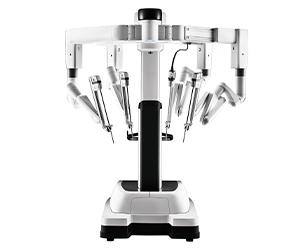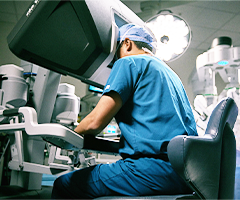Robotic Hiatal Hernia Surgery
While most hiatal hernias do not have symptoms, and therefore do not require treatment, some individuals may experience mild or serious symptoms that require treatments. Mild symptoms of hiatal hernia can include heartburn, acid reflux, or chest pain. Generally these more mild symptoms can be treated with lifestyle changes or medication, but a doctor may recommend surgery if:
- symptoms interfere with quality of life
- symptoms do not respond to other treatments
- hernia is at risk of strangulation, a more serious complication leading to tissue death and potentially life-threatening complications
- symptoms include ulcers, bleeding, or narrowing of the food pipe or esophagus
- Chronic inflammation of the lungs (pneumonia) from frequent inhalation (aspiration) of gastric fluids
If you suspect you may have a hiatal hernia, contact your Lee Health provider to see if surgery is a treatment option for you.
Minimally Invasive Surgical Options for Hiatal Hernia Repair
If your provider is concerned about your symptoms stemming from your hiatal hernia, your Lee Health provider may recommend surgery. If so, ask your doctor about the da Vinci™ Surgical System being used for your hernia repair.

Da Vinci Xi Surgical System
Our Lee Health surgeons use the da Vinci™ Surgical System, to operate through just a few small incisions. The da Vinci™ System features a magnified 3D high-definition vision system and tiny wristed instruments that bend and rotate far greater than the human hand.
As a result, da Vinci™ enables your surgeon to perform your surgery with enhanced vision, precision, and control. Robotic hiatal hernia surgery enables you to recover faster and with less pain than traditional open surgery.
The da Vinci® SP provides a unique and new surgical approach to very invasive traditional alternatives.
Benefits of da Vinci™ Surgical System
- Less Scarring
- Less Blood Loss
- Less Risk of Infection
- Significantly Less Pain
- Shorter Hospital Stay
- Quicker Recovery Time
- Faster Return to Normal Daily Activities
- In Many Cases Better Clinical Outcomes
Benefits of Robotic Hernia Surgery over Laparoscopic Hernia Surgery
In a laparoscopic hernia surgery a surgeon places trocars using 1-inch incisions (typically 3 incisions) to place a camera and various instruments needed to conduct the procedure. A surgeon views a video monitor and operates through the small trocars while an assistant holds the camera.
Through continued innovation and advancements in general surgery, we now offer the da Vinci™ Surgical System . This improved surgical option uses a much higher resolution camera than laparoscopic surgery that sends a 3-dimentional image to the surgeon. This visual improvement is responsible for significant improvements in surgical accuracy and patient safety. Additionally, robotic instruments are significantly improved from those used in laparoscopic surgery. Due to the multiple points of rotational ability these tools give surgeons better movement within the abdomen.
It is important to discuss the benefits and risks of robotic hernia repair with your surgeon to determine if this is the best option for you.
Ready to Take the Next Steps?
Related to Hernia Surgery
-
The da Vinci™ Surgical System
Lee Health's da Vinci technology enables your surgeon to operate with enhanced precision and control.
-
Robotic Surgery at Lee Health
Robotic-assisted surgery enables your surgeon to operate with enhanced precision and control.


